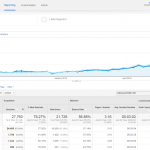Google Analytics is Now Secure: What You Need to Know

“For years we have followed our clients’ desires to secure their traffic or not, securing traffic for secure websites, and not for insecure ones. But with the increase in privacy related concerns we have made the decision to secure all communication to and from Google Analytics, protecting our clients, our client’s end users, and the broader internet”
Privacy concerns certainly prompted this change in security, and as a consequence there are some things you are going to need to know. There is no way to opt-out of this protection now, so the changes will impact everyone using analytics, so check out some of the things you need to know below:
-
Short-Visit Traffic
Google notes on their help pages that Analytics users might see some effects on short-visit traffic data because of this security change. Because HTTPS-encrypted traffic can be slower than traffic that isn’t encrypted, Analytics may end up missing some the short-visit traffic you would have normally measured more accurately otherwise. Encrypted traffic (which is going to increase because of this update) is likely to be slower than similar unencrypted visits. This can result in lost hits as visitors may navigate away from your page before Analytics has the chance to log the visit.
The most common instance is when someone lands on your page and leaves within second of opening a web page. According to the article, “The tracking pixel may have less of a chance to fire, “for example, if a user closes a page within 1 second of opening the page” when that traffic is encrypted”. While this is definitely a change to take note of, it appears as though it will be a minor impact to your overall measure of visits and consequential strategies.
-
Firewalls
This next issue is actually pretty big, and as far as we know, there is really no way to get around this hiccup yet. Users that have firewalls installed will block encrypted traffic, which means that when users with a firewall visit your website, Analytics is not going to be able to capture and collect any of that visit information. This is unfortunate and really just something to note at this when you are looking at your visit data: those who have firewalls will not be included in your visit count or other data that analytics collects.
-
It is a Universal Update
One thing that needs to be absolutely clear about this update is A) you can not opt-out (as I mentioned earlier) but also B) there is nothing that you need to do in order for it to take effect—no coding, settings, or downloads in order to have the security features. Google really made this move as a preventative measure for its clients, and as such, it is a totally universal update. This means that it has taken effect equally for everyone, and since the change occurred in April, you are already seeing the change on your analytics data!
-
Heightened Security Pros
So far these updates probably sound like a bit of a pain for measuring and tracking analytics data, but don’t fear. After looking into the research that exists on this change, I would say that the pros absolutely outweigh the cons. While some of the data might be skewed or necessarily omit some users based on firewall settings or short-visits, the security that comes with the update protests your analytics data from being hacked. It also makes sure that your website traffic is as safe as possible. This security means that your customers and clients are even more protected than they were previously.
-
HTTP to HTTPS
With this security update, Google is definitely moving towards having maximum security for their users. So, aside from the actual impact on Google Analytics, Google is also offering incentive for those who switch over their website from HTTP to HTTPS. Google has said that HTTPS sits have a potential ranking signal, meaning they are considered over HTTP sites when it comes to search results. When people fill out a secure form now on HTTPS websites (or, now, on non-secure pages protected with encryption by Google) there is no way the customer’s data can be stolen. It is clear to see why this plays to a favored spot in Google’s rankings.
-
More Information is on the Horizon
If you take a look around, there is actually very little written on this particular change that Google made earlier this year. It doesn’t mean that it isn’t an important change—as we described above, heightened security is always something that an SEO marketing firm likes to hear. Yet, the changes in counts and website data that is a consequence of this change has yet to be discussed at length. Most say that the data this change impacts is not going to be highly significant, yet I think with time these changes are going to be looked at more closely and it will be apparent if this change is really as minor as everyone is claiming. Regardless, more information is bound to be on the horizon.
The Takeaway
This update in April 2016 was a change for the better. Non-secure pages and un-protected websites will not protect users in a way they did not previously. As this article has explained, this change in security is going to impact some of your data—especially short-term visits and users who have firewalls in place. Yet, these negatives are outweighed by so many positives and there is bound to be much more information on the benefits (and perhaps, the consequences) of this update and security updates to come soon. It is also worth considering changing your site from HTTP to HTTPS to offer maximum security to your visitors, but also to gain some favor in the organic search rankings.
What do you think about this security update? Do you think the benefits of security outweigh some of the accuracy of pre-update data collection? Let us know what you think in the comments section below.








